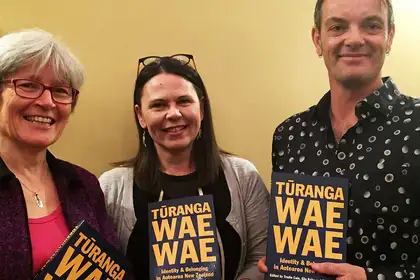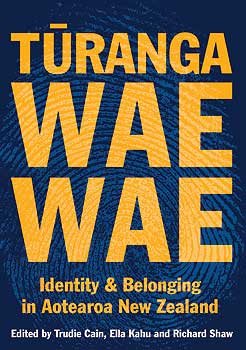

Turangawaewae: Identity & Belonging in Aotearoa New Zealand, published by Massey University Press last year, is the key text for a new level one core paper in Massey’s refreshed Bachelor of Arts programme.
Publisher Nicola Legat and editors Professor Richard Shaw, Dr Trudie Cain and Dr Ella Kahu believe the book offers a richness of ideas, stories and guiding information on the complexities of our past and present that makes compelling reading for anyone – not just BA students.
Its design makes it intellectually and visually appealing and accessible, with chapters embellished with photos, art, news clippings, quotes, poems and QR codes that link to additional reading and relevant websites, YouTube videos and Ted talks, as well as standard reading lists.
The book’s conceptual framework is built around four central themes – faces, voices, places and stories – and underpinned by the Māori meaning of Tūrangawaewae: place of belonging where you draw your strength from, your ‘standing place’. Sub-sections have been written by academics across the disciplines at Massey’s College of Humanities and Social Sciences.
The book – as a supporting text for the new core paper – provides a coherent thematic structure to a degree with abundant offerings from the humanities and social sciences, and to ask of readers: 'Who are we?' It spans the myths and legacies of All Blacks and Anzacs and explores the impact of Kapa Haka, Pasifika festivals, gay pride, the boom of ethnic eateries and events generated by an increasingly diverse population – all reflecting the range of influences on how we define and express our New Zealand-ness.
Text book sparks dinner table debate
Its authors say the book on our evolving identity and culture has triggered a range of comments from students, aged 18 to 65 and doing the paper internally or by distance. Feedback has included comments such as: “this stuff you’re teaching us – how did I not know this?’ Why didn’t they teach me this at school?’” says editor and contributing writer, Dr Kahu.
Students have also been discussing issues from the book at home around the dinner table and at workplaces, they tell her. Many say they now see things differently as a result of learning for the first time about key historical events, including the 1952 Waterfront Strike, 1970s Bastion Point protests and Dawn Raids in the 1970s and 1980s, as well as critically examining concepts such as our bi-cultural history, gender equality and neo-liberalism.
Paula Browning, Chief Executive of Copyright Licensing NZ said at the awards: “Education resources created and written in New Zealand, for New Zealanders, have a special part to play in supporting student success and developing what the New Zealand curriculum terms ‘confident, connected, lifelong learners’.
“The interplay between teachers, students and resources is rich and complex, but whether the resource explores our unique flora and fauna, our celebrated writers and artists, or our history and whakapapa, resources produced locally by teachers, education writers, publishers and public agencies are critical.”
Other categories in the awards included best student, teacher, te reo and digital resources under primary, secondary and tertiary headings. On the judging panel were Jenny Robertson, Tania Cotter, Jo Buchan, Ross Calman and David Glover.
For more information: Copyright Licensing New Zealand website.